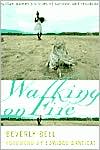Walking on Fire: Haitian Women's Stories of Survival and Resistance
Search in google:
Haiti, long noted for poverty and repression, has a powerful and too-often-overlooked history of resistance. Women in Haiti have played a large role in changing the balance of political and social power, even as they have endured rampant and devastating state-sponsored violence, including torture, rape, abuse, illegal arrest, disappearance, and assassination.Beverly Bell, an activist and an expert on Haitian social movements, brings together thirty-eight oral histories from a diverse group of Haitian women. The interviewees include, for example, a former prime minister, an illiterate poet, a leading feminist theologian, and a vodou dancer. Defying victim status despite gender- and state-based repression, they tell how Haiti's poor and dispossessed women have fought for their personal and collective survival. The women's powerfully moving accounts of horror and heroism can best be characterized by the Creole word istwa, which means both "story" and "history." They combine theory with case studies concerning resistance, gender, and alternative models of power. Photographs of the women who have lived through Haiti's recent past accompany their words to further personalize the interviews in Walking on Fire. Why does the movement against corporate globalization protest atmeetings like those of the World Economic Forum, recently completed in New York? What does the movement for global justice want? There are a million ways to answer these questions. One set of compelling answers is contained in Walking on Fire: Haitian Women s Stories of Survival and Resistance, a wonderful new book by Beverly Bell (Cornell University Press). Walking on Fire is a collection of interviews with Haitian women, with astute synthesizing text by Bell. ....Walking on Fire illustrates how the dynamics of corporate globalization overlay with local hierarchies, prejudices and systems of patriarchy to impoverish and marginalize women. Most searingly, Walking on Fire reveals the raw violence embedded in these overlapping systems of domination. The women in Walking on Fire recount stomach-churning stories of childhood slavery and abuse, rape and immiseration. ....Walking on Fire is subtitled "Haitian women's stories of survival and resistance" and the emotions of horror stirred by the book are matched by a sense of awe and inspiration of the women, many of whom do struggle just to survive, and especially of those who choose to respond to amazing hardship and myriad challenges by organizing and collective action to improve their and others' lives, and to fight for justice. (Russell Mokhiber and Robert Weissman)
ForewordPreface: Beat Back the DarknessAcknowledgmentsIntroduction: The Women of Millet Mountain11Resistance in Survival23My Head Burning with the Burden36A Baby Left on the Doorstep in a Rotten Basket39I Always Live That Hope45A Woman Named Roselie Who Fought Back50I Don't Have the Call, I Don't Have the Response55School572Resistance as Expression61I'll Die with the Words on My Lips68Singing a Woman's Misery73Getting the Poetry76The Struggle for Creole82Chaleron's Lesson83The Cultural Soul86Expanding the Space of Expression903Resistance for Political and Economic Change93My Blood and My Breath104A Grain of Sand110A Little Light115Jumping over the Fire120The Samaritan127Five Cans of Corn131Sharing the Dream136Chunk of Gold142Reshuffling the Cards1454Resistance for Gender Justice149Minister of the Status and Rights of Women157The Marriage Question163Walking with My Little Coffin166Women's Business171Support for the Children176A Country's Problems, A Woman's Problems178Deciding My Life182Assuming the Title "Feminist"184The Carriage Is Leaving1875Resistance Transforming Power193Lighting Candles of Hope213Sharing the Breadfruit214The People Say Jump216The More People Dream217You Can't Eat Gumbo with One Finger221Rocks in the River223A Stubborn Hope228Epilogue: Resistance as Solidarity231Get Up, Shake Your Bodies233Notes235Glossary243For Further Research and Involvement247Bibliography251








